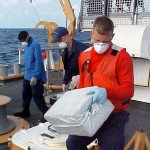Secretary of State Hillary Clinton used her two-day visit to Barbados last week to discuss a range of issues with Caribbean leaders. Top on the agenda was regional security and the increasing rates of crime and violence in the region. Other issues included, HIV/AIDS, the leading cause of death of young adults in the Caribbean, climate change and trade matters.

See Secretary Clinton’s Remarks Below:
Thank you very much. And it is truly a pleasure to be here in Barbados once again. I had the great opportunity of visiting the George Washington House earlier today and seeing the extraordinary progress that had been occurring since my last visit. And it was a reminder of how deep and long-lasting our ties are. And thank you so much, Minister, for hosting this event. Let me also thank both Acting Prime Minister Stuart and Prime Minister Thompson as well.
I want to express my appreciation to CARICOM Secretary General Carrington. Prime Minister Skerrit did have to return home for budget consultations. And thank you very much, Prime Minister Spencer, for being here as well. We had very fruitful discussions which are part of an ongoing, vigorous dialogue between the United States and the nations of the Caribbean, and in particular, CARICOM as a regional organization representing the needs and interests of those nations. I think that in our review of the work that we have done over the last 15 months of the Obama Administration, we’ve covered a lot of ground, we’ve made progress, but we have a long way to go.
At the top of our agenda is ensuring the security of our citizens. We have launched the Caribbean Basin Security Initiative in response to increasing rates of crime and violence in the region. And there was an excellent idea put forth earlier today from the minister from Saint Kitts and Nevis to hold a high-level conference on interpersonal violence, because it is a tragic fact that our region, this hemisphere, has the highest rate of interpersonal violence in the world, and that has to be addressed.
We have identified $45 million for this year and requested $79 million in the President’s budget for next year to train and professionalize security forces, boost anti-trafficking efforts, and promote citizen safety partnerships. Although the Caribbean Security Initiative is investing in crime prevention, we also recognize that it has to go hand-in-hand with social inclusion and development, especially in education and employment and strengthening legal institutions.
We are applying some of the lessons we have learned and are learning in Colombia and elsewhere to our security cooperation with Caribbean partners, bringing a new focus both to international collaboration and whole-of-government commitments. And in a spirit of shared responsibility, the United States is very focused on stopping the flow of illegal weapons and drugs, and reducing drug demand in our own home, and dealing with the continuing threat of illicit money.
We discussed a range of other challenges. All of our countries came together in recent months to develop the Caribbean Regional Partnership Framework for HIV and AIDS. The United States is committing $162 million this year to HIV and AIDS programs in the Caribbean. It is still a regrettable fact that the leading cause of death of young adults in the Caribbean is AIDS, striking and taking them from us at the height of their productivity, at the beginning of their family lives. And we are committed to working with you to address that.
We will also be providing another one of our shared objectives, $8 million for climate and energy programs, and supporting innovative solutions through the Energy and Climate Partnership of the Americas that I introduced at a conference we had a few months ago at the Inter-American Development Bank.
Last month, President Obama signed into law a 10-year extension of the Caribbean Basin Trade Partnership Act, which has helped to create jobs by expanding access to U.S. markets. He also signed the Haiti Economic Lift Program to support exports from Haiti that will create jobs and opportunities and is a further indicator of our deep commitment to the people of Haiti as they rebuild. But we are well aware that the global economic downturn has hit a number of our friends in the Caribbean especially hard. It has been a very difficult time because, of course, most of these island nations rely on tourism – if not their biggest form of income and economic activity, certainly among them. And as both the United States and Europe suffered from the economic downturn, so did tourism to these beautiful nations.
So we have a lot of work to do. And we believe strongly in addressing these issues in a collaborative fashion. One of the speakers at the beginning of the program said today that we have a long relationship between the United States and the Caribbean, but there was a sense that the United States was absent from the region. Well, we are back. We are back 100 percent. We are back and committed, we’re looking for solutions to common problems, and we’re also looking to listen. I came here to listen as much as to express our hopes and our plans, and I’m very grateful for the positive response and the agreement on what we’re calling the Bridgetown Declaration – Commitment, the Bridgetown Commitment, which embodies the points and expands on them that I have made. Thank you very much. (Applause.)


